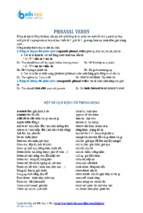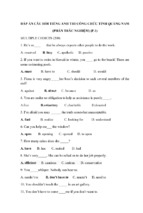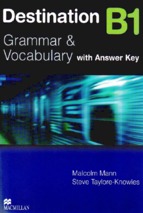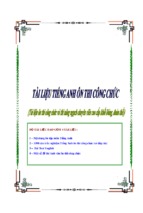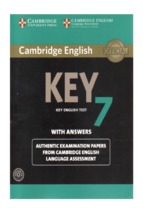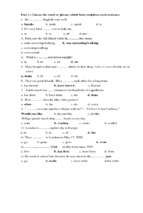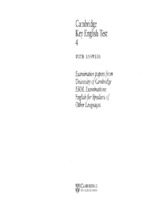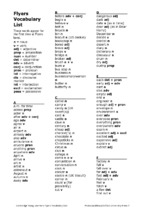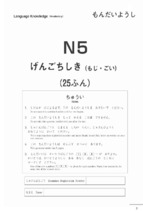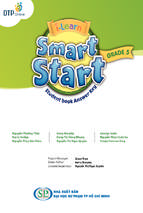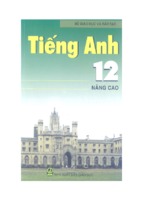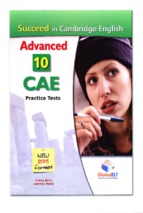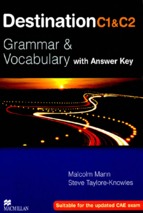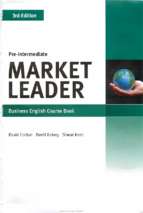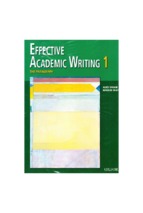STRUCTURED TESTS
Editorial Stanley
level 3
This page intentionally left blank
Written by / Escrito por
Edward R. Rosset;
Member of the
Bachelor of Arts Association
of Euskadi.
Miembro del Colegio de Licenciados de
Filosofia y Letras
de Euskadi.
Revisado por / Revised by
Beryl Aguado Lait
Principal of Apsley School of English
Portsmouth - England
Editado por / Published by
Editorial Stanley
Diseno y Maquetacion / Layout
Angela Gomez Martin
Diseno portada / Book cover designed by
Ves?
Imprime / Printers
Imprenta Berekintza
© Editorial Stanley
Apdo. 207 - 20300 IRUN - SPAIN
Telf. (943) 64 04 12 - Fax. (943) 64 38 63
I.S.B.N. 84-7873-220-9
Dep. Leg. BI-1727/00
First published / Primera edicion 1993
Reprinted / Reimpresion 1994
Reprinted / Reimpresion 1995
Reprinted / Reimpresion 1997
Reprinted / Reimpresion 2000
This page intentionally left blank
STRUCTURED TESTS
level 3
The contents of this book have been divided into
thirty different structures.
How to use this book:
Teachers can use this book in class as a complement
to any method in the following way.
One of the students reads a sentence choosing the
answer which he considers correct. Then, the other
students are asked for their opinions. This will give
occasion to numerous doubts and questions on the
part of the students. Once the right answer has been
established, the pupil or pupils could be asked to
build up similar phrasing. The answers to the
different levels can be found in the Key Book.
This page intentionally left blank
STRUCTURED TESTS
Whoever - whatever - whichever, etc
Should - ought to - so that - in order - in cases
Inversion of the verb after certain adverbs
Future progressive - Future perfect
The past perfect progressive tense
May - might
Regret - remember - forget - try - stop - etc
Could - might
Although/though - in spite/despite - even though
Too - enough
Otherwise - whether - unless - in case - but for
I wish - If only
Conditional
Perfect conditional
Reported or indirect speech
Reported speech into direct speech
Inversions
Supposed to - etc
For and since
Someone else - no-one else - anybody else
Certain - sure - bound - possible - probable - likely
The infinitive after verbs of knowing
Can't help - Infinitive or gerund
Should - other uses - so that - in case - in order - lest
If + will/would - I wish + subject + would
Passive voice
Be + Infinitive
Have + object + past participle
To be able
There to be
Assorted
Assorted
Assorted
Assorted
Assorted
Assorted
Index
l y
3y
5 y
7 y
9y
11 y
13 y
15 y
17 y
19 y
21 y
23 y
25 y
27 y
29 y
31 y
33 y
35 y
37 y
39 y
41 y
43 y
45 y
47 y
49 y
51 y
53 y
55 y
57 y
59 y
61 y
63 y
65 y
67 y
69 y
71 y
2
4
6
8
10
12
14
16
18
20
22
24
26
28
30
32
34
36
38
40
42
44
46
48
50
52
54
56
58
60
62
64
66
68
70
72
This page intentionally left blank
WHOEVER - WHATEVER - WHICHEVER ETC
1. Those boys are going to play 'truck'
that is.
a) whichever
b) whatever
c) whenever
d) however
2. The hotel was burnt to the ground,
did you escape?
a) however
b) how ever
c) when ever
d) where ever
will you find such wonderful
people.
a) Anywhere
b) Nowhere
c) Somewhere
d) Everywhere
hard she tries, she'll never lose her
accent.
a) Wherever
b) Whenever
c) Whichever
d) However
15. He is going to send us a 'click'
is.
a) whichever
b) whatever
c) whenever
d) what ever
5. You'll see this advertisement
you go.
a) wherever
b) whenever
c) however
d) whichever
8
12
14
4. 'There are two roads here!' 'Well, we'll
get there
we take.'
a) however
b) whenever
c) wherever
d) whichever
that
16. They all got drowned,
did you get
ashore?
a) how ever
b) however
c) wherever
d) when ever
said that is a liar!
a) However
b) Whoever
c) Whichever
d) Whenever
7. They live in Prick,
a) whatever
c) wherever
wrote that on the wall?
a) Whoever
b) Who ever
c) Whenever
d) Which ever
13. You'll find our books
you go in this
country.
a) everywhere
b) somewhere
c) whichever
d) whatever
3. I can't find my socks,
did you put
them?
a) what ever
b) which ever
c) where ever
d) wherever
6
11
that is.
b) however
d) whenever
17. I can't find my shirt,
did you
put it?
a) what ever
b) wherever
c) where ever
d) whichever
good it is, it won't be good enough
for her.
a) However
b) Whenever
c) Whatever
d) Whichever
18. There are two posible answers which
are right
shall I put?
a) However
b) Whenever
c) Wherever
d) Which ever
9. I'm sure she'll overcome
difficulties
she may encounter.
a) whatever
b) wherever
c) whenever
d) however
19. You'll see this make of car
you go.
a) wherever
b) where ever
c) however
d) whichever
10
20
happens I'll be there with you.
a) Wherever
b) Whatever
c) Whichever
d) Whenever
1
did that to you is a criminal.
a) However
b) Whoever
c) Whichever
d) Whenever
WHOEVER - WHATEVER - WHICHEVER - ETC
1
did this job was quite an artist.
a) Whoever
b) Whomever
c) However
d) Whichever
2. Our roof leaks
a) wherever
c) whenever
3
4
11. The car was wrecked!
did you
escape unhurt?
a) However
b) How ever
c) When ever
d) Where ever
it rains.
b) whichever
d) however
12
telephones say I am not in.
a) Whoever
b) Whichever
c) Whomever
d) However
gets up first prepares the breakfast.
a) Who ever
b) Whoever
c) Whichever
d) Whenever
13
happens don't go out alone.
a) Whatever
b) Whenever
c) Whichever
d) What ever
she goes I'll find her.
a) Whenever
b) Wherever
c) However
d) Whichever
5. He said that
properly.
a) whoever
c) whichever
14. Look at this room!
left all the
windows open?
a) Whoever
b) Who ever
c) Which ever
d) Whatever
you do, you must do it
b) whatever
d) whenever
6. 'I like the two coats.' 'Well,
you
choose I am sure will suit you.'
a) whatever
b) whichever
c) whomever
d) wherever
7
fast she does it, he does it faster.
a) However
b) Whichever
c) Whoever
d) Whatever
10. Hello, I am back!
this time?
a) Where ever
c) Wherever
is at the door, say I'm not in.
a) Whoever
b) Whichever
c) Whonever
d) However
16
you go I'll find you.
a) Whenever
b) Whichever
c) However
d) Wherever
17. She says that
a) whoever
c) whichever
8. That is a nice picture!
did you
buy it?
a) Who ever
b) Wherever
c) Where ever
d) How ever
9. Look at you car!
to it?
a) Whatever
c) Which ever
15
18
you do, it'll be OK.
b) whatever
d) whenever
well I do it, he does it better.
a) However
b) Whichever
c) Whoever
d) Whatever
19. What a beautiful jar!
did you
find it?
a) Who ever
b) Wherever
c) How ever
d) Where ever
have you done
b) What ever
d) How ever
20. Look at your hair!
to it?
a) What ever
c) Whatever
have you been a
b) How ever
d) Which ever
2
have you done
b) Which ever
d) How ever
SHOULD - OUGHT TO - SO THAT - IN ORDER - IN CASE
1. I don't suppose she'll come, but
come, let me know.
a) should
b) ought she to
c) should she
d) ought she
11. I don't suppose we'll do it, but
do it, I'll let you know.
a) would
b) should
c) ought
d) ought to
2. It's incredible that we
worked in the
same building for a year.
a) should
b) ought to
c) should have
d) ought to have
12. They put loudspeakers so that everyone
hear.
a) should
b) would
c) ought
d) ought to
3. Your mother
more tactful.
a) ought
c) must
13. It's curious that he
ask you rather
than me.
a) ought
b) ought to
c) should
d) would
to have been a little
b) should
d) would
we
14. It's vital that the supplies
reach the
flooded area soon.
a) ought
b) should
c) would
d) ought to
4. There
to be more nurses in this
hospital.
a) should
b) must
c) ought
d) would
15. I don't suppose he'll tell you, but
tell you, let me know.
a) should
b) should he
c) ought he
d) ought he to
5. It's stupid that you
sign these papers
without reading them.
a) should
b) would
c) ought
d) ought to
6. We are taking our umbrella in case it
rain.
a) ought
b) should
c) may
d) would
16. Your boss
to have been a little more
understanding.
a) ought
b) should
c) would
d) must
7. It's only natural that you
do that for
your son.
a) ought
b) ought to
c) should
d) would
17. There
to be more sentries round the
camp.
a) should
b) must
c) ought
d) would
8. I switched on the radio so that everybody
the news.
a) ought to
b) should hear
c) should have heard
d) ought to have heard
18. It's silly that you
documents.
a) should
c) ought
sign those
b) would
d) ought to
19. I'm taking some money in case we
stay overnight.
a) ought
b) should
c) many
d) would
9. You
told him that today is a holiday.
a) should
b) ought to
c) ought have
d) should have
20. It's quite normal that she
want
only the best for her son.
a) ought
b) ought to
c) should
d) would
10. They
to have gone by now.
a) should
b) ought
c) must
d) should to
3
SHOULD - OUGHT TO - SO THAT - IN ORDER - IN CASE
1. It's difficult to believe that we
lived
in the same town all this time.
a) should
b) ought
c) ought to
d) should have
2. I think you
tactful.
a) ought
c) must
11. You
told him that the paint is wet.
a) should
b) ought
c) ought to
d) should have
12. You
read the warning before you
rushed in.
a) ought to have
b) ought to
c) should
d) would have
to have been a little more
b) should
d) would
13. I don't suppose that will happen, but
it happen, let me know.
a) should
b) would
c) ought
d) ought to
3. There
to be more people interested.
a) should
b) must
c) ought
d) would
4. It is stupid that she
phoning first.
a) should
c) ought to
go without
14. You
told me that ages ago.
a) should
b) ought
c) ought to
d) should have
b) ought
d) would
5. She is taking her coat in case it
cold.
a) should
b) ought to
c) may
d) would
be
15. There
to have been more stands in
this fair.
a) should
b) ought
c) may
d) would
6. It is natural that you
love your son.
a) ought
b) ought to
c) should
d) would
16. It's incredible that she
go without
saying goodbye.
a) should
b) ought
c) ought to
d) may
7. We
told Jimmy that there is no
school today.
a) ought to
b) should
c) ought have
d) should have
17. We
a)
b)
c)
d)
8. He turned the volume up so that everyone
the music.
a) ought to hear
b) should hear
c) should have hear
d) ought to have heard
9. I don't suppose she'll tell me, but
me, I'll let you know.
a) should she
b) ought you to
c) should you
d) ought she
told him that today is Sunday.
ought to
should
ought have
should have
18. I spoke louder so that everybody
hear.
a) ought
b) ought to
c) should
d) should have
tell
19. Sorry, I know I
a) ought to have
c) must have
told you.
b) should
d) ought to
20. You
read the notice on the door
before you came in.
a) should
b) should have
c) ought
d) ought have
10. Mary
to have gone to school by
now.
a) should
b) must
c) ought
d) should to
4
INVERSION OF THE VERB AFTER CERTAIN ADVERBS
1. Scarcely
a)
b)
c)
d)
11. Very
when the storm broke out.
they had started off
they started off
did they start off
had they started off
2. Not till then
a) few
c) only then
a)
b)
c)
d)
b) did she realise
d) had she realised
3. No sooner
the coffee that she started
to feel sick.
a) she had drunk
c) had she drunk
4. Hardly ever
7. Never before
situation.
a) did he became
c) did he become
this switch be
15. Scarcely
b) does
d) has
17. Hardly ever
9
10
a) must
c) can
20. Not only
in town will we find a better house.
a) Nowhere
c) Somewhere
such a dilemma.
a) faced she
c) did she face
b) Nowhere
d) Everywhere
5
b) she had faced
d) had she faced
you, they beat you up too.
a) do they rob
c) they robbed
b) Anywhere
d) Seldom
these documents be
b) does
d) has
19. Never before
will your daughter find a better job.
a) Anywhere
c) Somewhere
b) does he arrive
d) did he arrive
18. On no account
touched.
b) they burglared
d) they burgle
b) he blew
d) does he blow
on time nowadays.
a) he arrives
c) he arrived
b) had I been
d) was I
b) he had finished
d) he finishes
his whistle they scored a
goal.
a) he had blown
c) had he blown
b) he became
d) did she become
8. Not only
the house, they destroy
everything too.
a) did they burglar
c) do they burgle
when she arrived.
16. No sooner
in such a terrible
a) I had been
c) I was
b) became he
d) he became
a) had he finished
c) he finished
that she called her
a) does she become
c) became he
b) I should
d) must
14. Only when she came so late
suspicious.
b) did he manage
d) manages he
a) must
c) can
6. So suspicious
neighbours.
a) I'd
c) I may
to get here on time.
5. On no account
turned on.
that we had been robbed.
do we realise
did we realise
did we realised
we realised
13. Were it not for the expense involved
do it straight away.
b) she drank
d) does she drink
a) he manages
c) he managed
b) seldom
d) nowhere
12. Only then
she had lost her purse.
a) she realised
c) realise she
have we been offered a bribe.
b) they rob
d) they are robbing
INVERSION OF THE VERB AFTER CERTAIN ADVERBS
1. Had I known you were ill I
come to
see you before.
a) would have
b) should
c) ought to
d) must
11. Not only
you, they laugh at you too.
a) they threaten
b) did they threaten
c) they threatened
d) do they threaten
2. Had we played better we
lost the
match.
a) wouldn't
b) wouldn't have
c) shouldn't
d) shouldn't have
12
3. Only when she spoke to me
how old
she was.
a) did I realise
b) did I realised
c) I realised
d) I did realise
13. Only by shouting
a) could
c) should
14. Never before
a) had I been
c) did I be
4. Not till then
of the facts.
a) he became aware
b) did he become aware
c) became he
d) had he become aware
in this situation
b) I had been
d) I was
done
16. Had he told me that, I
lent him
some money.
a) would
b) should
c) would have
d) should have
6. No sooner ....... his beer that he began to
feel sick.
a) he had drunk
b) he drank
c) had he drunk
d) does he drink
17. Not till then
how beautiful she was.
a) he realised
b) he had realised
c) did he realise
d) realised he
7. Hardly ever
to come to the meetings.
a) he manages
b) did he manage
c) he managed
d) manages he
this machine be
18. On no account
made.
a) does
c) can
b) does
d) has
9. So suspicious
that he called a
policeman.
a) does he become b) he became
c) became he
d) did he become
10. Never before
dilemma.
a) had we been
c) we were
he be heard
b) would
d) ought
15. Had he known how to do it, he
it.
a) should
b) would have
c) ought to
d) must
5. Scarcely
when it started to rain.
a) they had begun
b) they began
c) did they begin
d) had they begun
8. On no account
touched.
a) must
c) can
will you find a nicer picture.
a) Anywhere
b) Nowhere
c) Somewhere
d) Everywhere
19
b) we had been
d) were we
6
b) must
d) has
will we find such a bargain.
a) Any where
b) Nowhere
c) Somewhere
d) Everywhere
20. Only by gestures
each other.
a) could
c) should
in this terrible
radio contact be
we understand
b) would
d) ought
FUTURE PROGRESSIVE - FUTURE PERFECT
1. By the time we get there the show
will
a) have already started
b) already started
c) be starting
d) have been starting
11. Next year they will
twenty five years.
a) have be
c) be
13. Don't phone after 10. I'll
a shower.
a) have
b) be having
c) have had
d) had had
3. Next January I'll
French for three
years.
a) have learned
b) be learning
c) have learning
d) have been learning
14. Will you
night?
a) had had
c) be have
4. I always watch TV from 9 to 11, so at 10
tomorrow I'll
a) have watched TV
b) have been watching TV
c) be watching TV
d) watch TV
a party next Saturday
15. Sorry, but I won't
tomorrow.
a) doing
c) have done
16. By midnight they
non-stop.
a) will have
c) will
for three
b) have had
d) be having
the cooking
b) be doing
d) have doing
dancing 24 hours
b) will have been
d) are
17. I will
the book by June.
a) have written
b) wrote
c) be written
d) be writing
6. John will
the sitting room by Friday.
a) have painted
b) have painting
c) be painting
d) be painted
7. I'm sorry but I won't
the washing up
today.
a) be done
b) be doing
c) have done
d) have doing
18. Will you
your car tonight, Dad?
a) have used
b) have using
c) be used
d) be using
8. Will you
your bicycle this morning?
a) have used
b) have using
c) be used
d) be using
9. The President will
tonight.
a) have given
c) be giving
b) have been
d) have being
12. Professor Gray will
another talk
next Saturday.
a) be given
b) be giving
c) have given
d) gave
2. We are sorry, but we won't
to the
meeting.
a) coming
b) be coming
c) have come
d) have coming
5. By nine o'clock we will
hours.
a) have been training
b) have trained
c) be training
d) have training
married for
19. This time tomorrow we
concert.
a) will be listening
b) will have listening
c) Will listen
d) would listen
another speech
b) have giving
d) be given
to Sting's
20. The headmaster will
us another
chat on Saturday.
a) given
b) have given
c) gives
d) be giving
10. This time tomorrow I
on the beach.
a) will be lying
b) will be laying
c) will lay
d) I'd be laying
7
FUTURE PROGRESSIVE - FUTURE PERFECT
11. By 1995 we will
1. By the time we get to the station the train
will
a)
b)
c)
d)
have already left
already left
be leaving
have been leaving
a) have eaten
c) be eating
to our party.
a) coming
c) have come
a)
b)
c)
d)
b) be coming
d) have coming
here for six months.
a)
b)
c)
d)
have been coming
have come
be coming
have coming
a)
b)
c)
d)
a)
b)
c)
d)
for two hours.
a) have painted
c) be painting
7. Sorry, but I won't
meeting tonight.
a) be come
c) have come
8. Will your father
a) have used
c) be used
a) have gone
c) be gone
b) have painting
d) be painted
the car by 5
a) have repaired
c) be repairing
b) be coming
d) have coming
the car tonight?
b) have using
d) be using
another talk
out with you
b) be going
d) going
17. The mechanic will
o'clock.
to the Party's
on duty for 12
b) be
d) had had
16. Sorry, but she won't
tonight.
the hall by
b) have repairing
d) be repaired
18. I don't think she'll
with us.
a) coming
c) have come
b) be coming
d) have coming
19. By the time you're 40, you'll
of meat.
b) have given
d)be given
10. This time tomorow we'll
Bahamas.
a) be flying
c) fly
have been having
be having
had had
had
a) have been
c) had been
9. The Prime Minister will
this evening.
a) have giving
c) be giving
have been sitting
have sat
be sitting
sit
15. By 12 o'clock I will
hours.
have been training
have trained
be training
have training
6. The painters will
tomorrow night.
on this chair for
14. Breakfast is from 8 to 10, so at 9 we'll
breakfast.
have worked
have been working
be working
work
5. By midnight I will
cereals for
b) have been eating
d) be eaten
13. By ten o'clock I'll
six hours.
4. She always works from 8 to 12, so at 10
o'clock tomorrow she'll
a)
b)
c)
d)
b) have finished
d) finished
12. By the time I am 50 I'll
20 years.
2. I don't think they'll
3. Next week I'll
paying off the loan.
a) be finished
c) be finishing
a) have eaten
c) be eating
to the
20. By 2010 we'll
a) pay
c) have paid
b) have flown
d) be flown
8!
b) eat
d) be eaten
the mortgage.
b) be paying
d) paid
a ton
THE PAST PERFECT PROGRESSIVE TENSE
1. He
in that country for five years
when I first met him.
a) had lived
b) was living
c) lived
d) had been living
11. When we got to the spot the fire
all
night.
a) had be burning
b) had been burning
c) was burning
d) burnt
2. The Titanic
on the sea bed for 70
years when they found it.
a) had been laying b) had lain
c) had been lying
d) had laid
12. When she arrived I
a) have been working
b) had worked
c) had been working
d) worked
3. Luke
in the Navy for six months
when he had the accident.
a) had been serving b) had served
c) was serving
d) had serviced
13. When my mother and father got home I
watching TV for hours.
a) have been
b) was
c) was being
d) had been
4. They
trees all afternoon when I saw
them.
a) had planted
b) had been planting
c) were planting
d) had picking
5. We all knew he
stank.
a) was drinking
c) drank
14. When the boss arrived the secretary
letters for ages.
a) has been typing b) had been typing
c) had typed
d) typed
whisky again. He
15. We
in the same block for years and
we had never met.
a) had been living b) are living
c) have lived
d) lived
b) had been drinking
d) is drinking
6. When I got to the beach my wife
the sun for two hours.
a) was lying
b) had lain
c) will have been lying
d) had been lying
7. When I met the old preacher
years in that Parish.
a) he had been preaching
b) had been preaching
c) preached
d) was preaching
for two hours
in
16. That picture
in
years when I found
a) had lain
c) had been lying
the drawer for
it.
b) had laid
d) has been lying
17. They
for two hours when I went to
see the marathon.
a) had run
b) had been running
c) were running
d) have been running
for 20
18. He
a wife for a long time, when I
first met him.
a) were wanting
b) was wanting
c) had been wanting
d) had wanted
8. The lonely couple
a son for a long
time.
a) had been wanting
b) were wanting
c) wanted
d) are wanting
19. She
for hours when they got home.
a) had been asleep b) has been asleep
c) had slept
d) was sleeping
9. When she arrived I
for ten minutes.
a) will have waited b) waited
c) had been waiting d) was waiting
20. When I went to prison, Luke
for 10 years.
a) has been
b) was
c) had been
d) stayed
10. When I got there they
felling trees
for hours.
a) had been
b) had being
c) were
d) will have been
9
there
THE PAST PERFECT PROGRESSIVE TENSE
1. When I got there he
a) had painted
b) had been painting
c) has painted
d) painted
11. When we got there they
for about
an hour.
a) were running
b) had been running
c) ran
d) had run
for two hours.
12. When I met the general he
in
command for six months.
a) had had
b) was
c) had been
d) had being
2. Mr Smith was tired because he
all
day.
a) had had worked b) had been working
c) worked
d) was working
13. The lonely boy
a girlfriend for a
long time.
a) had been wanting b) wanted
c) was wanting
d) wants
3. The secretary
letters for two hours
when he arrived.
a) had been typing b) had typed
c) was typing
d) typed
14. When she arrived, her boyfriend
for two hours.
a) waited
b) was waiting
c) have waited
d) had been waiting
4. The children were tired because they
football all morning.
a) played
b) had played
c) had been playing d) were playing
15. By the look of the place they
cards
all night.
a) were
b) had been playing
c) played
d) were playing
5. There was still a smell of cigarettes.
Someone
there.
a) was smoking
b) had smoked
c) smoked
d) had been smoking
16. Looking at him you could tell he
the beach for hours.
a) had been lying
b) was lying
c) had lain
d) had laid
6. He
in those mountains for years
when we met.
a) had lived
b) was living
c) had been living d) lived
on
7. That Greek jug
on the sea bed for
2,000 years.
a) had been lying
b) had lain
c) had been laying
d) had laid
17. You could see that he
a) has been smoking
b) had smoked
c) had been smoking
d) was smoking
8. The sergeant
in the army for 20
years when I joined the regiment
a) had served
b) had been serving
c) was serving
d) had serviced
18. When I arrived at the bus stop, some
people
for half an hour.
a) were waiting
b) waited
c) had waited
d) had been waiting
9. They
old papers all morning when I
saw them.
a) had collected
b) had been collecting
c) collected
d) are collecting
19. He
the same job for 30 years when I
was told to help him.
a) was doing
b) had been doing
c) has been doing
d) had done
10. It was obvious that he
heavily all
night. He couldn't stand up.
a) had been drinking
b) was drinking
c) drank
d) is drinking
20. We
mountains for years when we
had the accident.
a) have been climbing
b) climbed
c) were climbing
d) had been climbing
10
all day.
MAY - MIGHT
1. The journey
was exciting.
a) might
c) might have
been hard but at least it
11. Never do that again. You
got killed.
a) can have
b) might have
c) could
d) may
b) may
d) may have
12. I wonder if I
a) might have
c) may
2. As her boyfriend hadn't come, she
thought he
missed the flight.
a) might have
b) may
c) may have
d) must
3. He said that I
a) may
c) might have
4
13. 'What are you doing here?' 'The
doorkeeper said that I
come in.'
a) may
b) might
c) may have
d) could have
go out if I wanted to.
b) might
d) may have
14. Your father is very late. He
an
accident.
a) may have
b) might have
c) could have
d) may have had
I see your papers, please? asked the
official.
a) Might
b) May
c) Must
d) Ought
5. If he had come by plane he
earlier.
a) may have
b) may
c) might have
d) might
15. If he had asked me for money I
given it to him.
a) might have
b) might
c) may
d) can
come
16. Well, you
told him. Everybody else
knows about it!
a) might
b) might have
c) may
d) could have
6. 'May I borrow your camera?"You
certainly
'
a) may
b) can not
c) might not
d) might
7. If you dropped your glass it
a) might have
b) might
c) may have
d) must
a little more cake.
b) might
d) would
17. Well, you
as well come with us.
a) may
b) may have
c) might have
d) must
break.
18
8. Our wishes
come true if we wish
hard enough.
a) might have
b) may
c) may have
d) must
I see your passport, please?
a) Might
b) May
b) Must
d) Might have
19. We didn't find anything, but we
found something, if we had looked
properly.
a) might have
b) may
c) might
d) may have
9. I told my mother that I
get home late
that night.
a) could
b) could have
c) might
d) might have
20. We
go tonight if we have time.
a) might
b) may
c) might have
d) may have
10. Why hasn't she phoned yet? Well, she
forgotten.
a) can have
b) has
c) might
d) may have
11
- Xem thêm -

